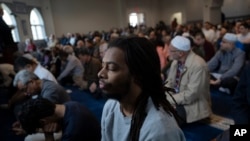This Ramadan, as Muslims across America fast and pray, many are giving generously to charities that help in Gaza and other far-off places in need. But the bulk of their charitable giving remains within the United States, helping with things like fighting poverty and improving health care.
“One of the myths that people have about American Muslims is that they send all their money overseas,” said Shariq Siddiqui, director of the Muslim Philanthropy Initiative at Indiana University.
In fact, Siddiqui said, 85% of an estimated $4.3 billion that Muslim Americans give every year stays in the U.S. What is more, while 50% of that money goes to Muslim-led organizations, about 40% backs non-Muslim groups.
“I think what people are surprised by is that the Muslim Americans are like most Americans: They are inspired and they give for many of the same reasons that people of other faiths in the United States give,” Siddiqui said in an interview.
Generosity
There are roughly 3.5 million Muslims in the United States, representing about 1.1% of the population. Siddiqui’s research has found that Muslim Americans tend to give more per capita to both faith-based and non-faith-based causes than non-Muslims. And they support a wide range of causes, from local food banks and homeless shelters to hospitals and universities.
“There are many different ways Muslims are giving back,” said Muhi Khwaja, co-founder of the American Muslim Community Foundation.
Muslim generosity peaks during Ramadan. That is because fasting during Ramadan and almsgiving, two of Islam’s five pillars, are inextricably linked. While there is no designated time for almsgiving, Muslims firmly believe that Ramadan carries a special religious significance, with God multiplying the rewards for charity given during the month.
As a result, observant Muslims in the U.S., as in the rest of the world, tend to fulfill their almsgiving obligation, known as zakat, during Ramadan.
According to the Muslim Philanthropy Initiative, Muslim Americans give an estimated $1.8 billion in zakat donations every year, with most given or pledged during Ramadan.
“Our research shows how important Muslims think Ramadan is to their giving, especially to almsgiving,” Siddiqui said.
Several Muslim charities contacted by VOA confirmed that they raise at least half of their annual revenue during Ramadan.
This Ramadan, which started March 11, Muslim Americans have been unusually generous with their money, responding to urgent appeals for aid to Gaza.
Islamic Relief USA, a major Muslim American charity, says it has delivered over 1 million ready-to-eat meals. Muslim Aid USA has given more than $1 million so far, according to CEO Azhar Azeez.
“I know every masjid [mosque], every school is trying to collect money and is collecting money and they are giving to reputable charities like Muslim Aid USA, Islamic Relief and others who have long-standing partnership with [aid groups in Gaza] that are doing work on the ground,” Azeez said in an interview.
The global response to the Gaza conflict initially fueled concerns among local nonprofit groups that it would cut into their funding. But local charities have weathered the storm, supported by donors more concerned about domestic issues, according to Zahid Hussain, director of hunger prevention for the Islamic Circle of North America (ICNA).
“People were generous enough to understand the immediate need here,” Hussain said.
Top priority
The Muslim Philanthropy Initiative’s research on Muslim American charity has led to some surprise findings. One is that supporting civil rights issues is not a top priority for Muslim Americans, despite concerns about growing Islamophobia.
Instead, the No. 1 priority for Muslims is poverty alleviation, both international and domestic, Siddiqui said.
Leading this effort in the U.S. is ICNA, one of the country’s oldest Muslim American charities.
While its international sister organization, Helping Hand USA, has been delivering aid to Gaza, ICNA Relief USA has been tending to domestic causes.
Operating in 42 states, ICNA offers free meals and free medical services to low-income families as well as resettlement services for newly arrived refugees.
The group distributes free food packages to families around the country regardless of “caste, creed, color and religion,” said Hussain.
Last year, the group delivered food to nearly 700,000 people around the county. This year, it is aiming to serve 800,000 to 900,000 people, according to Abdul Rauf Khan, the group’s chief operating officer.
He said that “100% of every dollar raised is spent here. We want to make an impact in America because this is where we live."
Hussain said Muslim Americans' giving to local charities reflects changing attitudes over the years. When he first immigrated to the United States from India, he said, he thought “nobody is poor in America, so I gave back to India.”
But after volunteering for ICNA, he said, he found that people were “facing hardship and hunger” in this country, too.
That realization has prompted many Muslim Americans to turn increasingly to supporting local community initiatives, he said.
“Of course, we have to help others, but first attention should be given to this country,” Hussain said. “We are going to get buried here, not back in our own country. This is our country.”
ICNA is not the only major Muslim charity supporting domestic causes. International Muslim American charities such as Islamic Relief USA and Muslim Aid USA spend a small portion of their revenues on domestic programs, from fighting hunger and homelessness to running a winterization program.
Azeez of Muslim Aid USA, who is also a board member of the Islamic Society of North American, said young Muslim American professionals in particular tend to give to domestic causes.
“We very strongly believe that it is our Islamic duty to also assist our brothers and sisters here in this great nation of ours where we enjoy so many mercies and bounties of God almighty,” Azeez said. “There is poverty, there is a need, there is hunger, and we want to take care of the needs of our own neighbors, of our own brothers and sisters who are in our backyard over here.”




